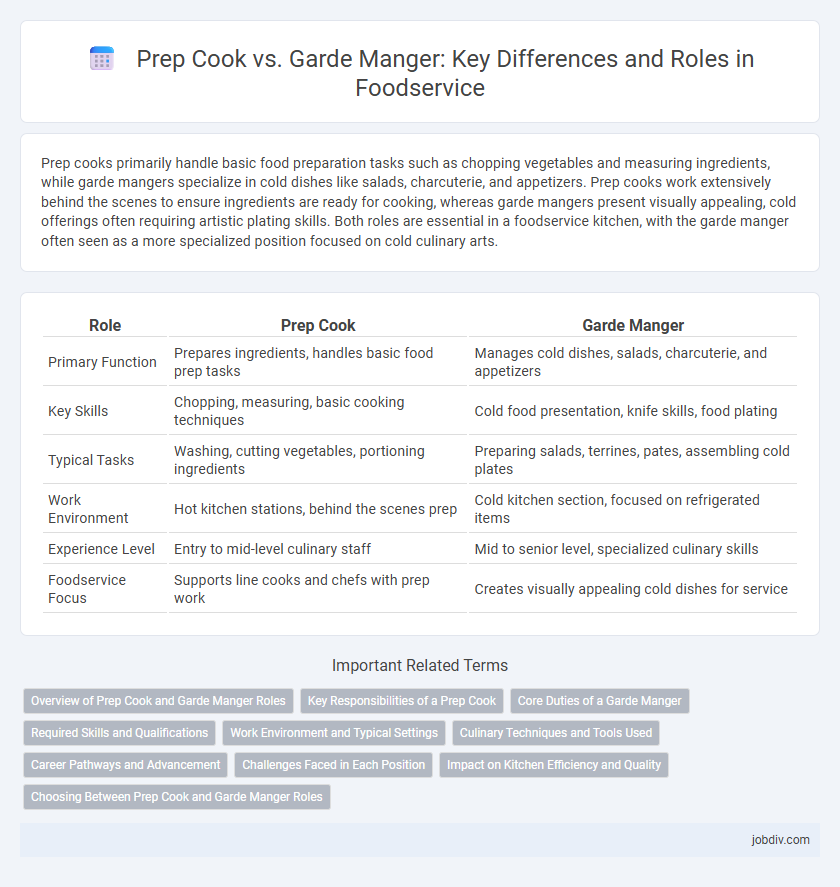Prep cooks primarily handle basic food preparation tasks such as chopping vegetables and measuring ingredients, while garde mangers specialize in cold dishes like salads, charcuterie, and appetizers. Prep cooks work extensively behind the scenes to ensure ingredients are ready for cooking, whereas garde mangers present visually appealing, cold offerings often requiring artistic plating skills. Both roles are essential in a foodservice kitchen, with the garde manger often seen as a more specialized position focused on cold culinary arts.
Table of Comparison
| Role | Prep Cook | Garde Manger |
|---|---|---|
| Primary Function | Prepares ingredients, handles basic food prep tasks | Manages cold dishes, salads, charcuterie, and appetizers |
| Key Skills | Chopping, measuring, basic cooking techniques | Cold food presentation, knife skills, food plating |
| Typical Tasks | Washing, cutting vegetables, portioning ingredients | Preparing salads, terrines, pates, assembling cold plates |
| Work Environment | Hot kitchen stations, behind the scenes prep | Cold kitchen section, focused on refrigerated items |
| Experience Level | Entry to mid-level culinary staff | Mid to senior level, specialized culinary skills |
| Foodservice Focus | Supports line cooks and chefs with prep work | Creates visually appealing cold dishes for service |
Overview of Prep Cook and Garde Manger Roles
Prep cooks handle fundamental kitchen tasks such as chopping vegetables, portioning ingredients, and preparing sauces to support the culinary team. Garde manger chefs specialize in cold food preparation, including salads, charcuterie, and plated appetizers, requiring advanced knife skills and artistic presentation. Both roles are essential for efficient kitchen operation, with prep cooks focusing on groundwork and garde manger emphasizing creativity and temperature control.
Key Responsibilities of a Prep Cook
A Prep Cook is primarily responsible for preparing ingredients by washing, chopping, and measuring vegetables, meats, and other food items to ensure smooth kitchen operations. They assist chefs by organizing mise en place, maintaining cleanliness, and following safety and hygiene standards. Unlike a Garde Manger, who specializes in cold dishes like salads and charcuterie, the Prep Cook's role is foundational in supporting all aspects of food preparation across the kitchen.
Core Duties of a Garde Manger
Garde Manger specializes in preparing cold dishes such as salads, charcuterie, pates, and hors d'oeuvres, requiring expertise in food presentation and preservation techniques. Key duties include assembling intricate platters, managing refrigerated ingredients, and ensuring compliance with food safety standards. This role demands precision in knife skills and creativity in flavor pairing to enhance the dining experience.
Required Skills and Qualifications
Prep cooks must have strong knife skills, basic food safety knowledge, and the ability to follow recipes accurately, often requiring a high school diploma or equivalent and on-the-job training. Garde Manger chefs need advanced skills in charcuterie, cold food presentation, and creativity, typically holding culinary school credentials and experience in upscale kitchens. Both roles demand attention to detail, stamina, and teamwork in fast-paced foodservice environments.
Work Environment and Typical Settings
Prep cooks typically work in hot, fast-paced kitchens focusing on basic ingredient preparation, often within bustling restaurants, hotels, or catering facilities. Garde manger chefs specialize in cold food preparation such as salads, charcuterie, and appetizers, usually operating in more refined settings like banquet halls, high-end restaurants, or specialty deli counters. The prep cook's environment demands endurance and speed, while the garde manger's workspace emphasizes precision, artistic presentation, and chilled workstations.
Culinary Techniques and Tools Used
Prep cooks primarily focus on basic culinary techniques such as chopping, peeling, and portioning ingredients using knives, peelers, and mixers to prepare mise en place efficiently. Garde manger chefs specialize in cold food preparation techniques like curing, pickling, and assembling charcuterie or salads, utilizing tools such as mandolins, slicers, and specialized garnishing knives. Both roles demand precision and knowledge of food safety but differ significantly in culinary methods and equipment priorities.
Career Pathways and Advancement
Prep cooks often start with foundational kitchen skills, preparing ingredients and supporting chefs, which can lead to roles like line cook or sous chef through experience and skill development. Garde manger specialists, focusing on cold dishes and charcuterie, typically advance by mastering culinary techniques and may progress to executive chef positions or specialize in catering and banquet management. Both career pathways emphasize hands-on experience, culinary education, and leadership abilities for advancement in the foodservice industry.
Challenges Faced in Each Position
Prep cooks often face the challenge of managing high-volume ingredient preparation while maintaining consistency and minimizing waste under tight time constraints. Garde manger chefs must master the complexities of cold food presentation, requiring precision in handling delicate items like charcuterie and salads, alongside strict hygiene standards to prevent contamination. Both positions demand adaptability and multitasking skills to meet the fast-paced demands of a professional kitchen environment.
Impact on Kitchen Efficiency and Quality
Prep cooks streamline kitchen operations by accurately measuring and preparing ingredients, which reduces order turnaround time and ensures consistent dish quality. Garde mangers specialize in cold dish preparation, enhancing menu variety and presentation quality; their expertise in intricate plating also elevates the dining experience. Efficient collaboration between prep cooks and garde mangers optimizes workflow, minimizes errors, and maintains high culinary standards in fast-paced foodservice environments.
Choosing Between Prep Cook and Garde Manger Roles
Choosing between Prep Cook and Garde Manger roles depends on skill specialization and kitchen needs; Prep Cooks focus on basic food preparation tasks such as chopping, peeling, and measuring ingredients, ensuring smooth workflow. In contrast, Garde Mangers are responsible for cold dishes, including salads, charcuterie, and pates, requiring advanced knife skills and artistic plating. Restaurants with high demand for intricate cold presentations typically prioritize Garde Manger expertise, while those with high-volume production favor the versatility of Prep Cooks.
Prep Cook vs Garde Manger Infographic

 jobdiv.com
jobdiv.com